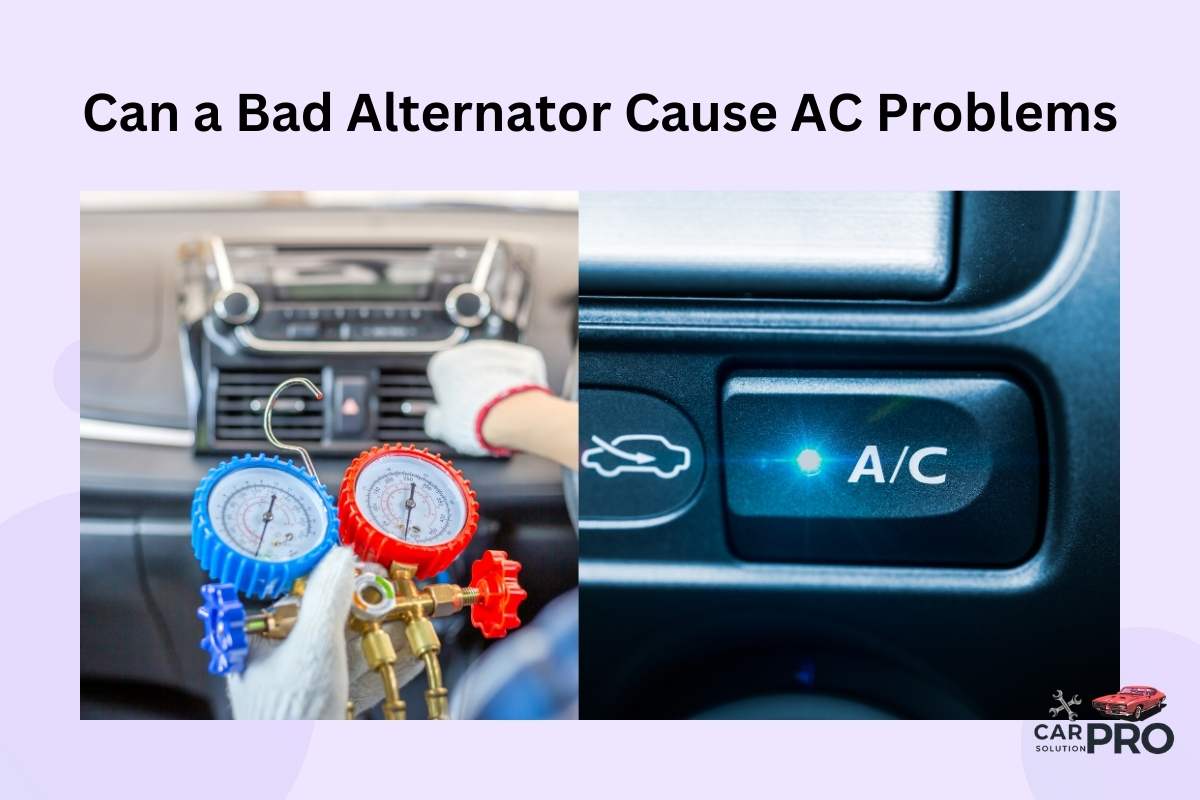A car’s electrical system is complex, with many components working together. The alternator plays a key role in powering various systems, including the air conditioning. When it fails, it can affect multiple parts of your vehicle.
A bad alternator can indeed cause AC problems in your car. The alternator supplies power to the AC compressor, which is essential for cooling. If the alternator isn’t working right, it may not provide enough power to run the AC system properly. This can lead to weak cooling or no cooling at all.
Signs of alternator issues affecting your AC include dim interior lights, strange noises from the engine area, and a dashboard warning light. If you notice these along with AC troubles, it’s time to check your alternator. Getting it fixed quickly can prevent more serious problems down the road.
Key Takeaways
- A failing alternator can cause weak or no cooling from your car’s AC system
- Symptoms include dim lights, engine noises, and warning lights on the dashboard
- Quick diagnosis and repair of alternator issues can prevent more serious car problems
Understanding the Role of the Alternator
The alternator is a key part of a vehicle’s electrical system. It keeps the battery charged and powers electrical components while the engine runs.
Function of the Alternator in Vehicle Electrical Systems
The alternator creates electricity as the engine runs. It turns mechanical energy into electrical energy. This process happens through electromagnetic induction.
Inside the alternator, a rotor spins within a stator. This spinning creates alternating current (AC). A rectifier then changes the AC to direct current (DC) for use in the car.
The alternator powers:
- Lights
- Radio
- Air conditioning
- Power windows
- Other electrical parts
It also charges the battery. This lets the battery start the car next time.
Impact of Alternator Performance on Electrical Components
A healthy alternator keeps all electrical parts working well. When it starts to fail, problems can occur.
Dim headlights often signal a weak alternator. The battery may drain faster than normal. This can lead to starting issues.
AC problems can arise from a bad alternator. The AC compressor needs a lot of power. A failing alternator may not provide enough.
Other signs of alternator trouble include:
- Strange noises
- Burning smells
- Dashboard warning lights
Regular checks can catch alternator issues early. This helps avoid bigger problems down the road.
Symptoms of a Bad Alternator
A failing alternator can cause various problems in your car. These issues often show up as warning lights, electrical problems, and battery troubles.
Warning Lights and Error Messages
The first sign of alternator trouble is often a warning light on your dashboard. Many cars have a battery-shaped light that turns on when the alternator isn’t working right. Some newer cars may show an “ALT” or “GEN” light instead.
Your car’s computer might also detect the problem. It could show error codes or messages about the charging system. These warnings are important and shouldn’t be ignored.
If you see these lights, it’s best to get your car checked soon. Waiting too long could lead to bigger problems.
Electrical Irregularities and Malfunctions
A bad alternator can cause weird things to happen with your car’s electrical parts. Your headlights might get dim or flicker. This is because the alternator isn’t giving them enough power.
Other electrical items might act up too. Your power windows could move slowly. The radio might cut out or make strange noises. Even your car’s clock might start losing time.
Jerking, stalling, or losing power while driving can also happen. This is because the engine needs electricity to run properly.
Strange noises are another clue. You might hear grinding or whining sounds from the alternator area.
Battery Charging Issues
The alternator’s main job is to keep your car’s battery charged. When it’s not working right, the battery can’t stay full.
You might have trouble starting your car. The engine might crank slowly or not at all. This happens because the battery doesn’t have enough power.
If you jump-start your car and it dies soon after, that’s a big sign of alternator trouble. A working alternator should keep the car running after a jump.
Using a voltmeter can help check for problems. A healthy system should show about 14 volts when the car is running. Lower readings might mean the alternator is failing.
Direct Effects of a Bad Alternator on AC Systems
A faulty alternator can seriously impact your car’s AC system. It can lead to power supply issues and damage key AC components.
Insufficient Power Supply to the AC System
A bad alternator may not produce enough electricity to run the AC properly. This can cause the AC to work poorly or not at all.
The AC compressor needs a lot of power to run. If the alternator isn’t making enough electricity, the compressor may struggle to turn on or keep running. This results in weak airflow from the vents.
You might notice the AC blowing warm air instead of cold. The system can’t cool the air without enough power.
Dim headlights or flickering dash lights may also point to an alternator problem affecting the AC. These are signs the electrical system isn’t getting enough power.
AC Clutch and Compressor Failures
A failing alternator can damage the AC clutch and compressor over time. These parts need steady power to work right.
The AC clutch engages the compressor. With low voltage from a bad alternator, the clutch may not engage fully. This causes the compressor to cycle on and off rapidly.
Constant on-off cycling wears out the compressor faster. It can lead to early compressor failure, a costly repair.
You might hear clicking noises when you turn on the AC. This often means the clutch is having trouble engaging due to low power.
In extreme cases, a bad alternator can burn out the AC compressor. This happens if the alternator sends power surges to the AC system.
Diagnosing Alternator-Related AC Problems
A faulty alternator can cause AC issues in vehicles. Proper diagnosis involves both professional techniques and DIY methods to pinpoint the problem.
Professional Diagnostic Techniques
Mechanics use specialized tools to check alternator function. They often start with a voltmeter to measure AC ripple. This test reveals if the alternator is producing excessive AC voltage, which can interfere with the car’s electrical systems.
Another key test is the load test. Technicians use a load tester to simulate the electrical demands of a running vehicle. This shows if the alternator can keep up with power needs.
Oscilloscopes help mechanics see detailed waveforms of the alternator’s output. Unusual patterns can point to specific problems like bad diodes or worn brushes.
DIY Troubleshooting Tips
Car owners can perform basic checks at home. A simple visual inspection can reveal loose or worn belts, which affect alternator performance.
Listening for unusual noises is helpful. A grinding sound may indicate worn bearings, while a whining noise could mean failing diodes.
Checking for dimming lights when the AC is on can signal alternator issues. If headlights or dash lights get dimmer when the AC runs, the alternator might not be producing enough power.
A basic multimeter can measure battery voltage with the engine running. If it’s below 13.8 volts, the alternator may not be charging properly.
Repair and Maintenance Solutions
A bad alternator can cause AC problems in your car. Fixing alternator issues and keeping up with regular maintenance helps prevent AC failures.
Addressing Alternator Defects
When an alternator fails, it may not provide enough power to run the AC system. Replace the alternator if it’s faulty. Check the voltage output with a multimeter. A healthy alternator should produce 13.5 to 14.5 volts.
Inspect the alternator belt for wear or damage. A loose or broken belt can’t turn the alternator properly. Replace worn belts promptly.
Examine electrical connections for corrosion or loose wires. Clean corroded terminals and tighten loose connections. This ensures proper power flow to the AC system.
Regular Vehicle Electrical System Maintenance
Routine checks can prevent AC problems caused by alternator issues. Test the battery regularly. A weak battery puts extra strain on the alternator.
Keep the alternator clean and free of debris. Dirt can cause overheating and reduced performance.
Check fuses and relays related to the charging system and AC. Replace any that are blown or faulty.
Have a mechanic inspect the electrical system yearly. They can spot potential issues before they cause AC failures.
Frequently Asked Questions
The alternator plays a key role in powering a car’s electrical systems, including the AC. Understanding how it affects various components can help diagnose issues.
Does the AC compressor affect the alternator’s performance?
The AC compressor can impact the alternator. When the AC is on, it puts extra load on the engine, which in turn makes the alternator work harder to produce more electricity.
This increased demand can sometimes reveal underlying alternator problems that weren’t noticeable before.
What are the signs that an alternator is failing?
Dimming headlights are a common sign of alternator issues. Other indicators include a weak battery, strange noises, and electrical problems.
Dashboard warning lights may also come on. If the car stalls or has trouble starting, it could point to alternator failure.
How can a malfunctioning alternator impact fuel consumption?
A faulty alternator can lead to increased fuel consumption. When the alternator isn’t charging properly, the car’s computer may try to compensate by burning more fuel.
This inefficiency can result in noticeably lower gas mileage over time.
Is the car’s cooling system influenced by the alternator condition?
The alternator does affect the cooling system. It powers the electric cooling fans that help regulate engine temperature.
If the alternator fails, these fans may not work properly, potentially leading to engine overheating.
How is the AC system connected to the alternator?
The AC system relies on the alternator for power. The alternator provides electricity to run the AC compressor clutch and other electrical components.
When the alternator fails, it can cause the AC to work poorly or not at all.
What are the procedures for testing an alternator?
Testing an alternator typically involves using a voltmeter to check its output. A mechanic will measure the voltage at the battery with the engine off and running.
They may also perform a load test or use a specialized alternator tester for more detailed diagnostics.


